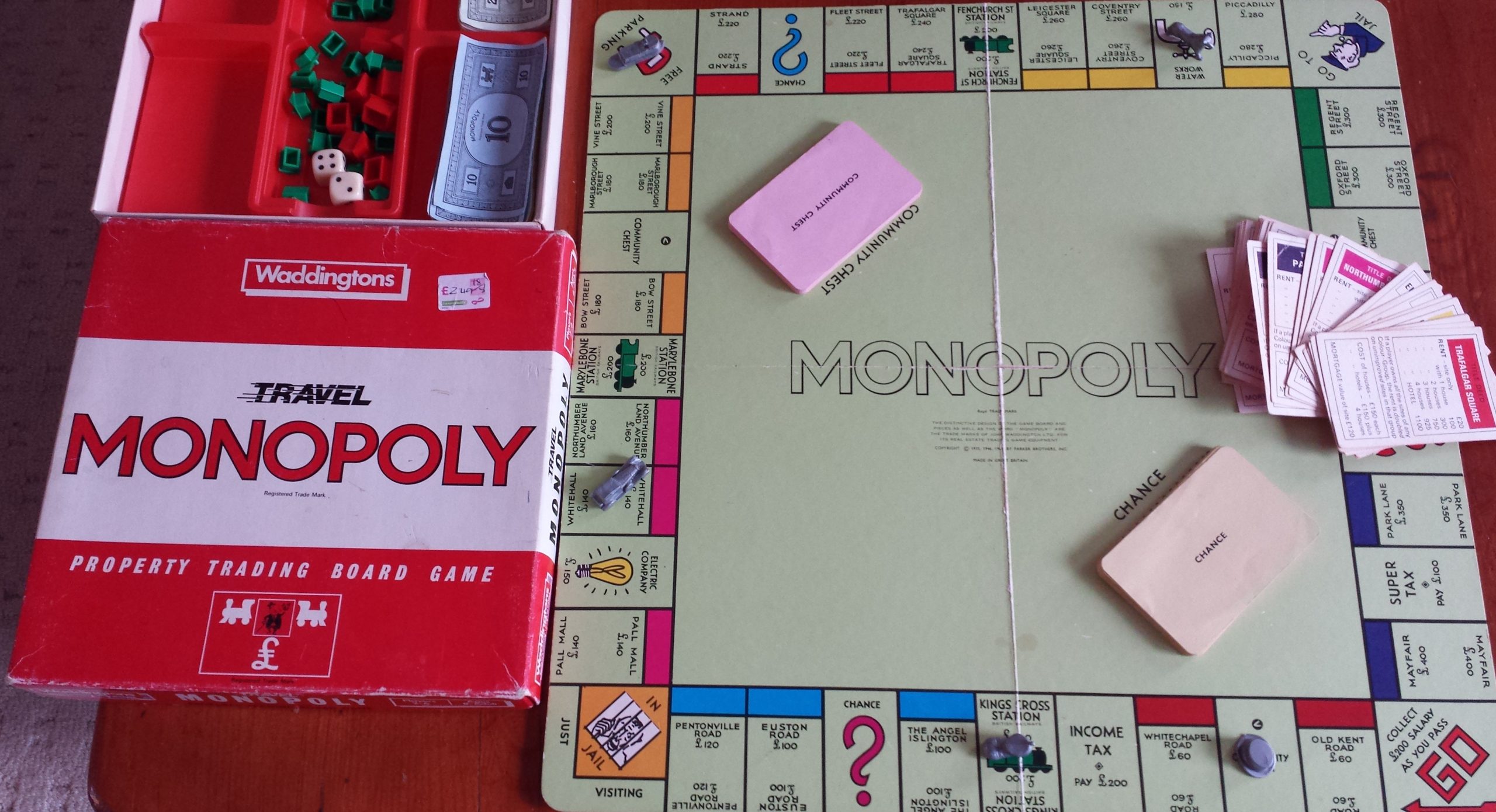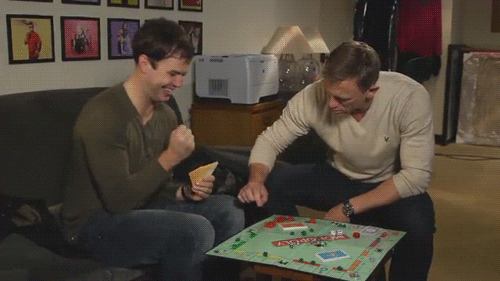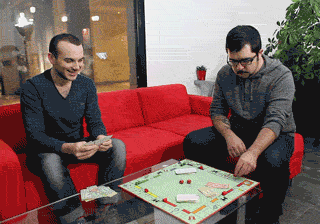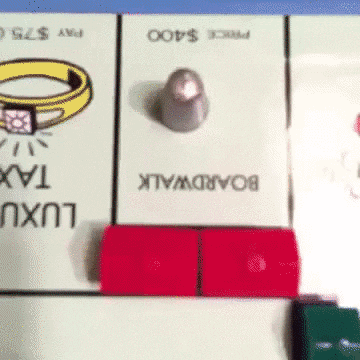
Sunday in our house: all three children have independently settled down to a board game. All of my Enid Blyton fantasies are coming true. But before I can don my frilly apron and serve up lashings of ginger beer, I hear snatches of angry conversation:
‘No. We NEVER play that rule’
‘Well, it is the rule’
‘So…’
Then, an adult voice. My partner shouting above the melee of three indignant children:
‘I don’t even know why you’ve chosen this game!’
And then I know. I realise what has happened. Blyton has been ousted by Orwell, or worse still Darwin, as I realise my delightful offspring have embarked on a game of Monopoly: where only the richest, the most ruthless survive in a kind of dystopian hell.
Monopoly causes all the strops. It’s true – search Monopoly gifs and there’s Daniel Craig having a strop.

The Auction Rule
We always argue about whether we play this particular rule, and how. It allows you to land on a property you don’t want and sell it to your sister at a hugely inflated price. Because despite the fact you landed on it last turn too and could have just bought it, you waited and bid for it in an auction against two younger siblings before tactically dropping out of the bidding, inflating the price, leaving one younger sister with hardly any money. This is as true in our house now as it was for me about 35 years ago.
Losing Money
This is where my 10 year old struggles. When others run out of money, she offers to lend them some (interest free of course). When she runs out of money, she is gleefully declared bankrupt by the others. The combination of glee and defeat generally culminate in the sort of eruption Mount Vesuvius would be proud of.

The Free Parking Issue
Yet another rule row before we even start. Aunty Marie does pool the taxes, fines, etc and if you are lucky enough to land on free parking then you win the money. Again, it is the eldest who protests most loudly that it ‘isn’t even a proper rule’ and furthermore he objects because landing on free parking and scooping the loot is just down to luck. He, like many other gamers objects to games that rely on luck. He doesn’t need luck; he has a ruthless devotion to the rules and a fanatical loyalty to Capitalist principles which is frankly terrifying.

Luck
There’s the rub. A lot of people object to games which rely heavily or solely on luck. There seems to be some shame attached to enjoying something ‘light’. I understand to an extent. Just look at Shut The Box… where’s the joy in repeatedly rolling dice on the off-chance that you roll the right combination, several times, that shuts the box? But… succeed in shutting the box and the joy! The sheer sense of accomplishment! I defy you to stop playing this game when you have just lost by being one single, solitary, soul crushing roll away from shutting the box!

Luck based games can be just as fun and compelling as strategy games and I have no time to feel ashamed of enjoying something.
Besides, is Monopoly all luck? Not really. You can be as lucky as you like but play against my son and he will ruin you. He’s12.
So if it’s not luck, why do we hate it?
Profit at the cost of others?
This definitely causes the bitterest arguments. Yet, in other games it is accepted. I can deduce and then block or steal your route in Ticket to Ride, and deliberately so. In Coup we gleefully all claim to be the Duke as we save up to assassinate each other. It’s bloody annoying. But no-one cries, storms off and declares they are ‘NEVER playing that again’.
In all games, other than cooperative ones, a basic principle is I win therefore you lose. Strategy is twofold: how do I maximise my advantage and how can I do most damage to my opponents?
Lack of Rule Clarity?
There are plenty of games where there is fluidity with the rules. Before we start we often establish house rules – perhaps adapted for who is playing or how long we have to play. Sometimes my partner and eldest son will read the rule book anyway but then bow to my superior wisdom* and embrace the house rules.
Boggle, for instance, is a game I have for a long time adapted. It is only recently that I have introduced the rule that you cross out and don’t score any word that someone else also has. I have avoided that rule because, as a child, playing against adults and losing is one thing – but scoring zero and having all of your answers invalidated is demoralising in the extreme.
For every other game rule adaptation is fine. Yet, in Monopoly, even before we start we are combative.
*stubbornness
So what is it then? What is our beef with Monopoly?
I don’t know for sure but every time it comes out, I hang up my apron, pack away the vintage tea service and don my body armour. Where does Monopoly live in your house- pride of place on the games shelf or shoved in a cupboard hidden under a deluge of ‘useful’ things you bought from the middle aisle in Lidl?
Comtemdrs Rdy?
Sorry, let me remove the mouthguard…
Contenders Ready? Let’s play….
Monopoly Facts
- Originally named The Landlord’s Game, it was invented by Elizabeth J Magie in 1904 to illustrate the dangers of capitalism and promote socialism – there were two versions, one collaborative, and one competitive.
- Charles Darrow copied and patented it in 1935
- Parker Bros. rejected it as it was too complicated
- In 1936 Waddingtons, Leeds produced Monopoly
- During the second world war special editions containing silk maps and currency were produced by Waddingtons, Leeds and sent to PoWs.
You can come along to a Cards or Die event and play it or you can play one of my other more popular/ less fighty games.
